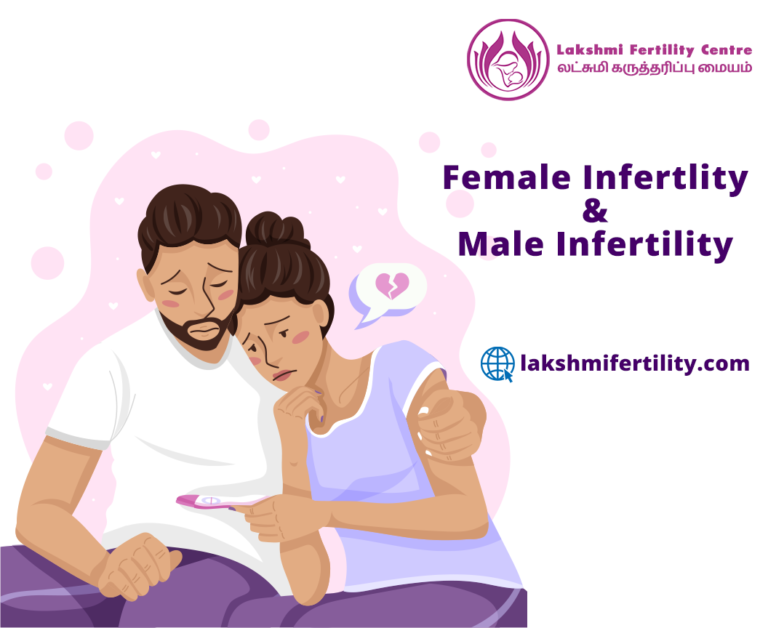INFERTILITY
Infertility is a medical condition characterized by the inability to conceive after a year of regular unprotected sexual intercourse. It can affect both men and women and may result from various factors. It is more essential for individuals or couples facing infertility concerns to consult with a healthcare professionals in Lakshmi Fertility Centre or a Best Fertility Centre in Karaikudi. They can provide a personalized assessment and recommend appropriate treatments based on the specific factors contributing to infertility.

FEMALE INFERTILITY
MALE INFERTILITY
Female infertility can result from various factors affecting the reproductive system. Female infertility is a condition where a woman faces challenges in conceiving or maintaining a pregnancy.
-
OVULATION DISORDERS:
Conditions such as polycystic ovary syndrome (PCOS), where the ovaries may not release eggs regularly, can contribute to infertility.
-
FALLOPIAN TUBE DAMAGE OR BLOCKAGE:
Blockages or damage to the fallopian tubes can prevent the egg from reaching the uterus or the sperm from reaching the egg.
-
ENDOMETRIOSIS:
Endometriosis is a condition where tissue similar to the lining of the uterus grows outside the uterus. This can affect the function of the ovaries, fallopian tubes, and uterus.
-
UTERINE PROBLEMS:
Abnormalities in the structure of the uterus, such as polyps or fibroids, can interfere with implantation or cause problems with the growth of the fetus.
-
AGE - RELATED FACTORS:
Fertility declines with age, especially after the age of 35. The quantity and quality of a woman's eggs decrease over time.
-
HORMONAL IMBALANCES:
Disorders affecting hormonal balance, such as thyroid disorders or disorders of the pituitary gland, can disrupt the menstrual cycle and ovulation.
-
LIFESTYLE FACTORS:
Smoking, excessive alcohol consumption, and extreme weight fluctuations can negatively impact fertility.
-
INFECTIONS:
Pelvic inflammatory disease (PID) resulting from sexually transmitted infections (STIs) can lead to scarring and damage to the reproductive organs.
Male infertility refers to a man’s inability to cause pregnancy in a fertile female partner. It can result from various factors that affect sperm production, sperm quality, or the delivery of sperm.
-
LOW SPERM COUNT (OLIGOSPERMIA):
Having fewer sperm in the ejaculate than the normal range may reduce the chances of fertilizing an egg.
-
POOR SPERM MOTILITY ASTHENODPERMIA:
Sperm with low motility (movement) may have difficulty reaching and fertilizing an egg.
-
ABNORMAL SPERM MORPHOLOGY:
Sperm with abnormal shapes may have difficulty penetrating the egg.
-
EJACULATION ISSUES:
Problems with ejaculation, such as retrograde ejaculation (when semen goes backward into the bladder) or premature ejaculation, can affect fertility
-
BLOCKAGES:
Obstructions in the reproductive tract, such as in the vas deferens or ejaculatory ducts, can prevent sperm from being ejaculated.
-
HORMONAL IMBALANCES:
Disorders affecting hormones such as testosterone, luteinizing hormone (LH), and follicle-stimulating hormone (FSH) can impact sperm production.
-
LIFESTYLE FACTORS:
Factors such as smoking, excessive alcohol consumption, drug use, obesity, and exposure to environmental toxins can impact male fertility.
-
INFECTIONS:
Infections of the reproductive tract, such as epididymitis or sexually transmitted infections (STIs), can affect sperm production and function.
